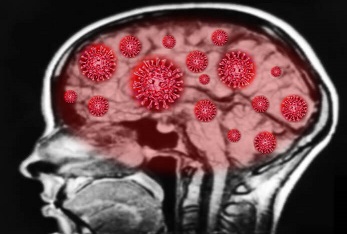MIT Study Shows That Long COVID Neurological Issues Is Due To Delayed Clearance Of SAR-CoV-2 Caused By Immune Imprinting!
Long COVID - neuroPASC - Immune Imprinting May 12, 2023 2 years, 9 months, 2 days, 2 hours, 2 minutes ago
Long COVID: Despite the fact that SARS-CoV-2 primarily targets the respiratory system, this treacherous pathogen doesn’t stop there. In its destructive journey through the human body, it often reaches the central nervous system (CNS), causing distressing neurological symptoms.

Intriguingly, these symptoms don’t merely appear during the acute phase of COVID-19. They have a much longer shelf life, persisting well after the initial respiratory disease has been brought under control, and persisting, in some cases, for several months after recovery from infection. This medical mystery, known as neuroPASC (neurological post-acute sequelae of COVID-19), has puzzled researchers since the pandemic's onset.
What exactly happens within our bodies that allows for such a long-lasting neurological impact? The pathophysiological mechanisms behind this complication are a complex puzzle, with pieces including COVID-19 driven immune dysfunctions, impaired vagus nerve signaling, hormonal dysregulations, persistence of SARS-CoV-2 reservoirs, auto-antibody evolution, and interactions between SARS-CoV-2 and the host's virome or microbiome.
One of the most thought-provoking pieces of the
Long COVID and neuroPASC puzzle is the emerging hypothesis of incomplete clearance of SARS-CoV-2 infection. This prolonged viral presence could either be due to the formation of a resilient viral reservoir or an incomplete immune response that fails to fully eliminate the virus.
The theory that antibodies, known as markers of previous pathogen exposure such as other types of coronaviruses and potential contributors to local pathology, might play a role in neuroPASC is gaining traction.
This led a team of researchers from Ragon Institute of MGH, MIT and Harvard Medical School-USA, Massachusetts Institute of Technology-USA, University of Verona-Italy, and San Maurizio Hospital-Italy, to embark on a prospective cohort study. This study aimed to determine whether alterations in the humoral immune response to SARS-CoV-2 in the serum and cerebrospinal fluid (CSF) could be found in individuals with neuroPASC. What they discovered were distinct humoral signatures that characterized individuals with and without neuroPASC.
Intriguingly, individuals with neuroPASC showed a diminished systemic response to SARS-CoV-2. In contrast, they showed an expanded systemic response to common Coronaviruses. These distinct features were mirrored in the CSF, and were notably prominent in individuals with a poor outcome. This unusual finding points towards a phenomenon called 'original antigenic sin' or 'immunologic imprinting', where pre-existing immune responses against related viruses shape the response to a current infection.
In layman’s terms, the immune system, when faced with a new virus, recalls its previous encounters with similar viruses and shapes the current response based on those past experiences. This bias, it seems, can lead to an incomplete or delayed clearance of SARS-CoV-2, resulting in persistent neuroinflammation and the development of neuroPASC.
Post-acute neurological complications (neuroPASC) present a significant burden
to a large proportion of SARS-CoV-2 patients. They can affect previously healthy individuals, even those with asymptomatic or mild disease, and can linger for months, impacting functional capacity and work ability.
Despite the growing consensus that immune-mediated mechanisms play a significant role in driving neuroPASC, the exact biological pathways and biomarkers that could explain these debilitating secondary effects of SARS-CoV-2 infection remain ill-defined. The identification of these could potentially revolutionize patient care and open new avenues for the development of disease-modifying therapies.
Our understanding of neuroPASC's pathogenesis is further complicated by the sheer heterogeneity of PASC clinical manifestations, which include neurological, respiratory, vascular, or rheumatologic complications. This suggests that the underlying pathophysiological mechanisms are likely multifaceted and might even differ between individuals, which further complicates the task of finding a one-size-fits-all therapeutic approach.
The findings from the aforementioned study represent a significant step forward in our understanding of neuroPASC. The humoral immune response signatures identified could potentially serve as biomarkers for diagnosing neuroPASC and predicting its severity. Moreover, the novel insights into the potential role of 'original antigenic sin' in the development of neuroPASC could pave the way for new therapeutic strategies aimed at modulating the immune response to SARS-CoV-2 and mitigating the risk of long-term neurological complications.
However, despite these exciting advancements, there are still many unanswered questions. For instance, what triggers the immune system to recall past encounters with similar viruses and shape its response to SARS-CoV-2 in this way? And why does this phenomenon lead to persistent neuroinflammation in some individuals but not others? Additionally, it remains unclear whether the distinct humoral immune response signatures observed in individuals with neuroPASC are a cause or a consequence of the disease.
Future research is needed to answer these questions and further elucidate the complex interplay between SARS-CoV-2, the immune system, and the CNS. This could ultimately lead to the development of more effective strategies for preventing, diagnosing, and treating neuroPASC, thereby reducing the long-term burden of COVID-19.
We are only beginning to understand and address the long-term complications associated with this virus collectively known as Long COVID. The neurological effects of COVID-19, and the subsequent condition known as neuroPASC, are real, significant, and demand our continued attention. As research in this area progresses, we can hope for advancements in treatments and preventive measures that will help improve the lives of those affected by this challenging condition.
We are finally at the stage where the medical and research community that once denounced SARS-CoV-2 viral persistence is finally coming to terms that there is no such thing as COVID-19 recovery and that past diagnostic protocols of using nasal or mouth swabs to ascertain COVID-19 recovery might be simply misleading. In reality, viral persistence is not only widespread but is found in all that have been exposed to the virus!
The study findings were pubslihed in the peer reviewed journal: Brain.
https://academic.oup.com/brain/advance-article/doi/10.1093/brain/awad155/7158783?login=false
For the latest on
Long COVID, keep on logging to Thailand Medical News.
